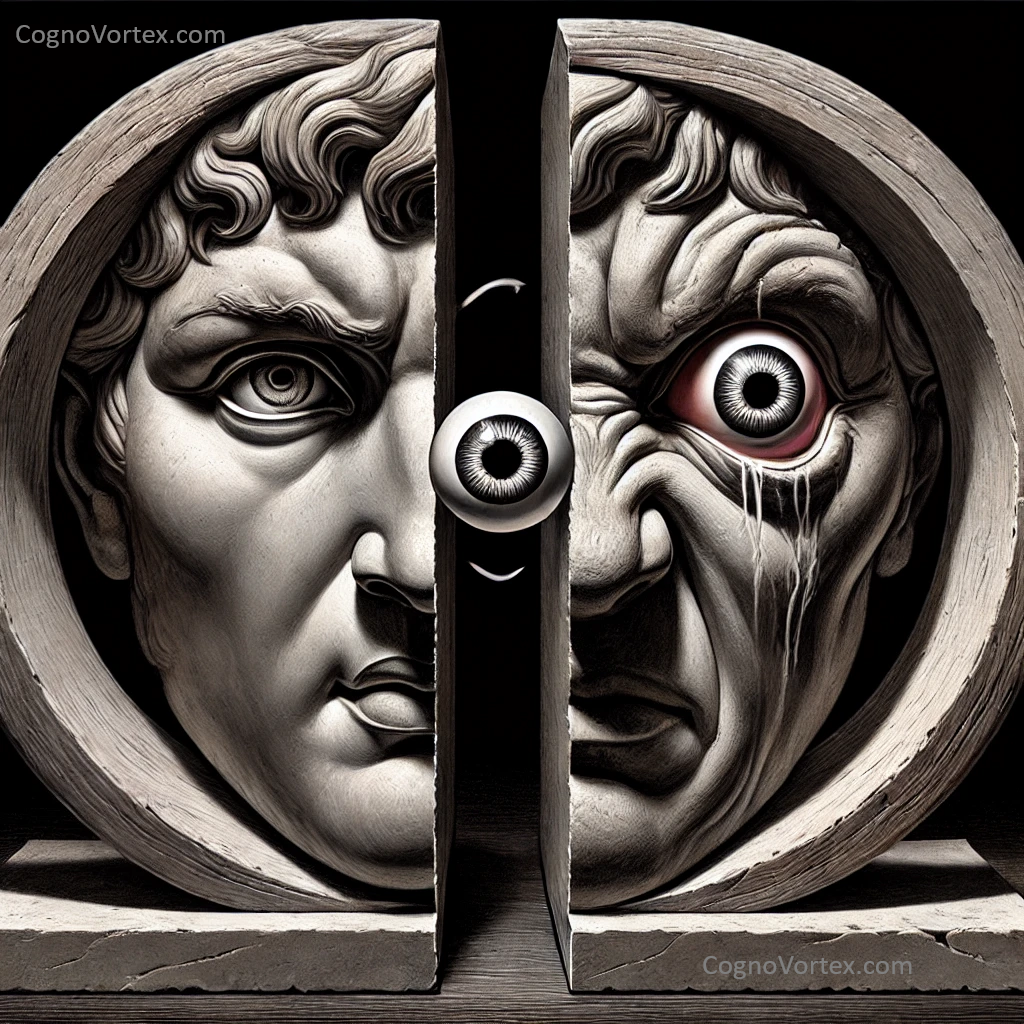There is a kind of psychic economizing in the tension we call “self.” If we could dissect it into its bookends, we’d find it spanning two fundamental poles: rewarded habits and unrewarded awareness. Between these poles lies the self as both executor and object of perception, caught between automatic cycles of ease and the friction of effort.
On one side, the self finds its “rewarded” ground in confident habits, behaviors worn smooth by time, repetitions that provide comfort and identity. This is the side where the ego accumulates credit, where action moves like clockwork—an almost reflexive belonging. Here, perception seems self-contained, unchallenged. There is little to remind it of itself; action flows outward without drag.
On the other side, the “unrewarded” state looms—an unconfident, effort-laden place, where the self ceases to be certain and must inspect its own mechanism. To live in this space is to feel the grit of switching views, an uncomfortable loosening from the ego’s automatic flow. Effort here is conscious, searching, educating, and ultimately suffers the strain of unselfing. Here, perception is no longer a simple loop of action and reward; it breaks and reflects upon itself, asking, “Is this still me?”
The balance—if one might call it such—is that after awareness suffers the burden of effort, it eventually relieves itself, returning to the habitual, back into the confident bookend. The self “earns” its way back to its routines, but only after it has paid in the currency of its own uncertainty. And then it continues, quietly crediting itself until it is called again to cross this threshold of discomfort.
In this cycle of credit and cost, the self experiences relief as much as it does pressure. It exists in tension, between the security of automaticity and the vigilance required by perception itself—moving between knowing and not-knowing, trusting and questioning. And in so doing, it is both container and contained, limit and limit-maker.
***
The Self Between Repetition and Differentiation:
Gilles Deleuze’s Difference and Repetition offers a philosophical structure that resonates with this understanding of self as a dynamic tension between rewarded routine and effortful awareness. Deleuze examines how identity is forged not through static sameness, but through iterative cycles that allow for both continuity and divergence. The self’s movement through familiar, rewarded behavior and into the discomfort of self-reflection aligns with Deleuze’s distinction between repetition as continuity and difference as divergence or novelty.
For Deleuze, repetition is not mere sameness; rather, it is layered with variation and carries the potential for change, precisely because repetition always involves subtle, often unacknowledged difference. Each act of self-affirming routine or “crediting” is, in Deleuzean terms, a repetition—an instance where the self reaffirms its identity through what it perceives as familiar. But this repetition is never perfectly identical; each iteration allows for slippage, the possibility of divergence beneath the surface. When the self is forced from its confident habits into the “effort-laden” realm of awareness and self-reflection, it mirrors Deleuze’s idea of difference erupting within repetition, the movement of identity revealing difference as a fundamental force within perception.
In Deleuze’s framework, true transformation occurs through what he calls “difference in itself”—a process in which difference is not an anomaly or deviation from a norm but the very substance of reality. This is akin to the self experiencing its own routine as effort-laden and self-reflective, confronting the limits of its “mechanical” behaviors. Here, identity is destabilized and the self undergoes a form of “becoming other,” as it momentarily steps outside its routines, moving from the automatic to the perceptual, from ease to friction.
This dovetails with the self’s oscillation between effortless belonging and effortful unselfing. Deleuze’s philosophy, with its emphasis on differentiation within cycles, mirrors the experience of moving from the habitual to the conscious, where the self confronts the limits of what it has “been” and entertains the possibility of what it might become. Each return to automatic behavior is subtly informed by this encounter with difference, enriching the self while paradoxically allowing it to resume a form of stability.
In Deleuze’s terms, then, the self’s tension between confident habit and conscious reflection is not a closed loop but an open spiral. Each passage through awareness reshapes the repetition that follows, carrying forward a trace of the difference encountered. The self thus becomes an assemblage in Deleuzean terms—a tension between repetition and differentiation, never a fixed entity but a perpetual oscillation within the flows of perception and self-formation.
